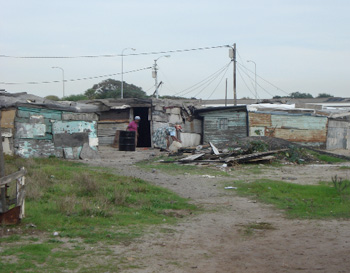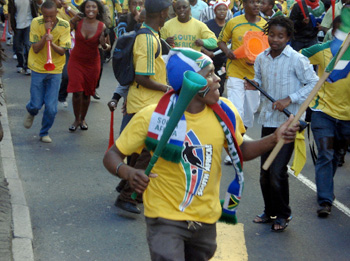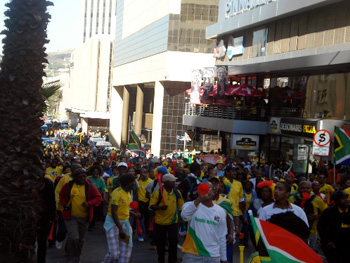 |
 |
 |
||||||||||||||
Voices from the Field- Rebecca Tweneboah
 |
|
Rebecca Tweneboah, a 2L student at California Western School of Law, flew to Africa to learn about that continent’s struggle to strengthen the rule of law, and help build structures that assist in reconstructing civil society after a civil war. Liberia’s civil war was particularly brutal, with child soldiers, body mutilation and the massive use of rape against women. The country, long a pillar of stability and political independence, is rebuilding its civil institutions since the overthrow of President Samuel Doe and the subsequent civil wars in the 1990s. The country faces many challenges – the prison system, lack of enforcement of contracts, and poor protection of private property to name but a few.
Rebecca went to intern with a German human rights lawyer, Jorg Stippel, from the Government Technical Cooperation Agency of German (GTZ). Jorg, a team member of Proyecto ACCESO, is a long-time legal reform specialist with many years in Bolivia and Chile working with ministries of justice, judiciaries and police forces in post-dictatorship periods. With his work in Liberia, Jorg is particularly interested in the plurilateralist approach to law and the use of traditional problem-solving methods by ethnic groups. His mission for the German Government is to assist in several projects to reform the justice sector.
Rebecca, whose has parents from Ghana and Jamaica, worked with Jorg following her time in South Africa, experiencing the World Cup. South Africa, too, has struggled with rebuilding a pluralistic society and has managed to incorporate fourteen official languages in its Constitution of 1994. Liberia’s many ethnic groups can learn from the experiences in South Africa. Problem-solving mechanisms, like tribal courts, mediation and other forms of traditional dispute resolution have legitimacy in many parts of Africa, more than the colonially imposed legal transplants imported from Europe. Rebecca will be working in this context for the summer and has prepared a series of entries about her experiences in Liberia, a most difficult post-conflict country in which to build a rule of law.
My trip to South Africa
 |
|
Finally arrived in Cape Town, South Africa with the great pleasure of realizing my check-on luggage had not arrived with me. Never a great start to a trip. On my way to the hotel, I had the same fears I always have whenever I decide to go on these worldwide excursions: what am I doing here, why did I come, maybe I should just go back home.
It definitely turned out to be a trip of a lifetime. World Cup fever was everywhere. There was a huge vuvuzela that displayed the countdown to the World Cup, and after the World Cup started, to each World Cup game. I would grow to have a love/hate relationship with the infamous vuvuzelas.
Before the World Cup kicked off, I visited one of the townships in Cape Town called Langa. It hurt to see the natives of this land called South Africa living in self-made shacks. Unable to enjoy the beautiful views or beachfront walks along the boardwalk that their white counterparts continue to utilize. Not until you are in South Africa do you realize how recently institutional apartheid ended, and how engrained apartheid still is in the daily life of South Africans.
The World Cup
The first game of the World Cup was OUT OF CONTROL. We went into downtown Cape Town to partake in the ‘Bafana Bafana’ (the name South Africans have given to their football team) fever. People were everywhere! There were makeshift parades in the street, with everyone blowing their vuvuzelas. Whenever you heard someone blow their vuvuzela, everybody else would follow suit. We danced in the streets so long that by the time we reached the fan park it had reached capacity. We decided to go to another fan park, which turned out to be a bad idea when we were almost trampled to death.
 |
 |
 |
|
 |
|
My first World Cup game was the Italy vs Paraguay game at the Green Point Stadium in Cape Town, South Africa. The stadium is absolutely beautiful and we had really good seats. Luckily, it was a good game as well, with both sides scoring a goal.
The next game I attended was the Cameroon vs Netherlands game. Cameroon was already out of the tournament at this point, but they put on a good show for their final appearance in the World Cup. I sat next to the Cameroon fans, and they were definitely a fun bunch. Everybody was dancing and cheering, and if the team did something they did not approve of, the crowd loudly expressed its disapproval.
Round of 16
 |
|
I watched the quarterfinal match between Ghana and the US at the Waterfront fan park. I was nervous from the beginning, which made it an extremely difficult game to watch. I along with the majority of South Africans were supporting Ghana.
Many of my classmates supported the United States for obvious reasons, but my heart has always been with Ghana (the country of my father’s birth). When it got to the later stages of the game, during the second fifteen-minute period of overtime, I could no longer handle the stress.
I walked away from all the screens and paced up and down a flight of stairs, until there was less than thirty seconds left, then sprinted back to the fan park area to celebrate with everyone.
Thank goodness that one was over, onto the Quarterfinals!
Quarters
This will go down as one of the saddest days in my life. How amazing would it have been to have an African country make it to the semifinals of the World Cup, the year the Cup was in Africa. Clearly, it was not meant to be, because as soon as Asamoah Gyan missed the penalty at the end of the second fifteen-minute period, I knew we lost that chance. Instead of going out that Saturday night I went straight to bed. I feared if I ventured onto the streets of Cape Town I may run into many Uruguay supporters, and I would have held them responsible for the actions of their cheating player, the infamous ‘Suarez.’
I was happy to leave Cape Town before the semifinal match between Uruguay and the Netherlands. It would have been too painful to remain, as the Uruguayan fans descended on Cape Town.
 |
|
Day two in prison
Yesterday was a bad day, but today was a sad day. I stopped for a minute and took a look around. There was nothing there. My soul hurt for those that work in the prison, and those subject to live in it. Today I spoke with a sergeant about how to implement sport in the prison. Later, I realized prisoners do not have enough food to eat and cannot take showers. Eight prisoners were taken to the hospital that day for rashes they developed all over their body as a result. The only hospital in Liberia turned these prisoners away. The hospital refused to help these prisoners until the Ministry of Justice paid its debt to the JFK Hospital in Liberia.
The Director of Prisons came along later that day. I told him about the lack of food and soap at the prison. I made him aware that a major outbreak is on the horizon if he does not deal with the hygiene issue. He told me they are “aware” of the situation and had a “meeting” about it earlier that day. I wanted to shake him and tell him to take a look around. I wanted to know if he thought a “meeting” and his ‘awareness’ fixed the problem.
In Liberia, the only way is the hard way. When I got here, I thought I would read a few cases, file several motions, and go to court. I quickly realized Liberia was far off from having those systems in place, so I shifted my focus. Many inmates stay in prison for years without their cases being heard by a judge. Years in prison without knowing how long you will stay or why you are there. However, in order to file these petitions, one must know who to file the petitions for, and the only way to know this is to look through their files. Well, this is where it gets interesting because there were no files.
We physically went to the prison and removed paperwork from broken down filing cabinets. GTZ, the Germany company I work for, built a record keeping room, since the old one did not even have a window. Each time it rained everything in the office got soaked. The more paperwork I went through, the more I realized how messed up the system is in Liberia, from top to bottom. People were admitted into the prison system with names like, “Dr. Dre,” without statement of charges sheets, so you do not even know the facts of the crime, and sometimes, all you found was a sheet with a name and not much else.
I looked online to research how to file petitions, and it gave me a step-by-step process. Somehow, I get the feeling that in Liberia, it will not be so easy.
One must wear many different hats while working in Liberia.
Sometimes my boss is a secretary, a gopher, or even a carpenter before he becomes a lawyer again. This irritated me at first, but now I rather enjoy how I literally am able to see projects through from beginning to end, and my boss gives me the freedom to make necessary decisions, even if those decisions require money from the German government! The downfall, you have to do everything! And micromanage everything! Nothing gets done if you are not constantly involved, making sure others follow the procedure you implemented.
Things are going well so far. I just pray the project does not crumble when my foreign accent is no longer reminding them of their duties on a daily basis. They mean well, I just think years of war and lack of resources has made them skeptical to the fact that things can actually change.
Switching gears, this is one of my pet-peeves in Liberia: Being ripped off.
As soon as you open your mouth in Liberia people salivate at the chance to rip you off. At an outside market buying fruit, my non-Liberian accent cost me an extra 350 Liberian dollars ($5USD). I paid 500 Liberian dollars, $7USD, for ONE pineapple, and thought I was getting a deal because they brought it down from the original 600 Liberian dollars. In my defense, I usually thrive at markets such as these, after my visits to Ghana and Jamaica I know how the game works and do not get ‘jipped’ for my current American status. But for some reason I am constantly getting ripped off in Liberia.
The problem does not cease with the market place, but continues in self-proclaimed four-star hotels run by the Lebanese. At the Cape Hotel, in Mamba Point, I ordered a penne pasta with grilled chicken. This item was not on the menu, but there were other pastas mentioned, one being seafood pasta for $15USD. We all know seafood is always more expensive than chicken, and the same applies in Liberia, however, on this day, the hotel owner found it appropriate to charge me twenty-six American dollars for penne pasta and grilled chicken. Twenty-six dollars! I have never been so blatantly ripped off in my life. At least with the pineapple I had to wait to speak with native Liberians to decipher that I was duped, but this time I knew right away.
Needless to say, I will never eat at the Cape Hotel ever again, and I am trying to publish my blog about the experience in a Liberian paper. Maybe next time he will think twice before adding the customary foreigner surcharge.
copyright 2012 CWSL all rights reserved